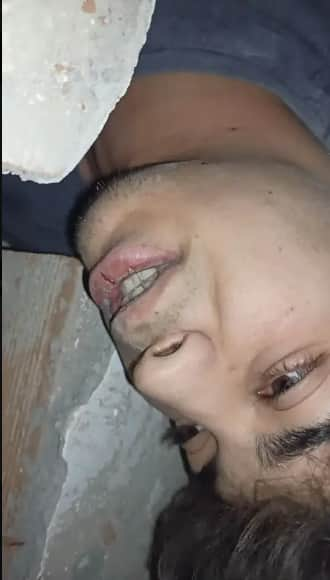adiamanA 17-year-old high school student has captured Turkish hearts after he filmed a farewell message to loved ones as he was trapped under the rubble of his home during last week’s earthquake. Taha Erdem and his family were fast asleep when a magnitude 7.8 earthquake struck their hometown of Adıyaman in the early hours of February 6. Taha was suddenly awoken by a violent jolt that shook the four-story apartment building in a blue-collar neighborhood in central Anatolian. City.
Within 10 seconds, Taha, his mother, father, younger brother and sister were falling down with the building.
He found himself alone and trapped under tons of rubble, with waves of powerful aftershocks stirring the rubble, squeezing his space between a mess of concrete and bent steel.

(Image credit: AP)
Taha takes out his cell phone and begins recording a final goodbye, hoping it will be discovered after his death.
“I think this is the last video I’ll ever shoot for you,” she said from the cramped space, her phone trembling in her hand as the tremors rattled the building.
Showing remarkable resilience and bravery for a teenager, believing he was speaking his last words, he lists his injuries and talks about his regrets and the things he hopes if he is alive The screams of other people trapped can also be heard during the video.
“We are still trembling,” says Taha before reciting the Muslim prayer in Arabic.
“There are so many things I regret. God forgive me for all my sins. There are so many things I want to do if I get out of here alive today. We’re still trembling, yeah. My hand Not shaking, it’s just an earthquake.”
The teen states that he believes his family is dead, along with many others in the city, and that he will soon join them.
But Taha was destined to be one of the first to be rescued from the destroyed building. After two hours, the neighbors pulled him out of the debris and took him to his aunt’s house.
Ten hours after the earthquake, her parents and siblings were also rescued by local residents, who dug through the rubble of the building with their bare hands and whatever tools they could find.
When The Associated Press spoke to the family on Thursday, they were living in a government-provided tent, along with hundreds of thousands of others who survived the disaster in southern Turkey and northern Syria, which has killed more than 43,000. More people were killed.
“This is my home,” said Zeliha, 37, Taha’s mother, as she watched excavators dig up their old life and load it into heavy trucks.
“Boom-boom-boom, the building came crashing down on us floor by floor,” she recalled, as she shouted her son’s name as she was trapped under the rubble, hoping all five of them would be together. could have died Family.
Erdems’ little kids? Daughter Semanur (13) and son Yigit Sinar, 9, were sleeping in their parents’ room when the earthquake struck.
But Taha could not hear his mother’s cry because of the pile of concrete. Neither could she hear her son’s cries in the darkness, and both assumed the other lay dead in the destroyed building.
It was only when Jelliha, her 47-year-old husband Ali, who cleans at the hospital, and the other children were taken to her sister’s home that they learned Taha had survived.
Zeliha said, “The world was mine at that point.” “I have nothing but my children.”
The story of the Erdem family is one of many emotional stories of human fortitude to emerge from the wider disaster zone. Many vividly remember the horrors of being trapped beneath their homes.
Ibrahim Zakaria, a 23-year-old Syrian rescued on February 10 in the Syrian coastal city of Jabaleh, told the AP that he survived by licking water dripping from an adjacent wall, began to pace and lose hope. To be alive in our waking moments.
“I almost gave up because I thought I was going to die,” he said from his hospital bed. “I thought: there is no rescue.”
In the Turkish city of Gaziantep, 17-year-old Adnan Muhammad Korkut was trapped for four days before being rescued. He told the private IHA news agency that he felt so thirsty that he drank his own urine.
Muhammad Enes Yeninar, 17, and his 21-year-old brother were rescued after 198 hours in nearby Kahramanmaras.
The IHA reported that they said they cried for the first two days, mostly thinking about their mother and whether she had survived. They later started comforting each other? Are you talking about brotherhood? And eating powdered protein.
Also in Kahramanmaras, 17-year-old Alina Olmez was pulled from under the rubble after 248 hours.
“I try to spend time on my own,” she said.
Remarkable survival stories often emerge during disaster, especially after earthquakes, when the world’s media record survivors’ hopes of recovery as each hour ticks by.
Following the 2010 Haiti earthquake, a 16-year-old girl was rescued in Port-au-Prince 15 days after the earthquake, which devastated the city. Three years later, a woman trapped under a collapsed building in Dhaka, Bangladesh was rescued after 17 days.